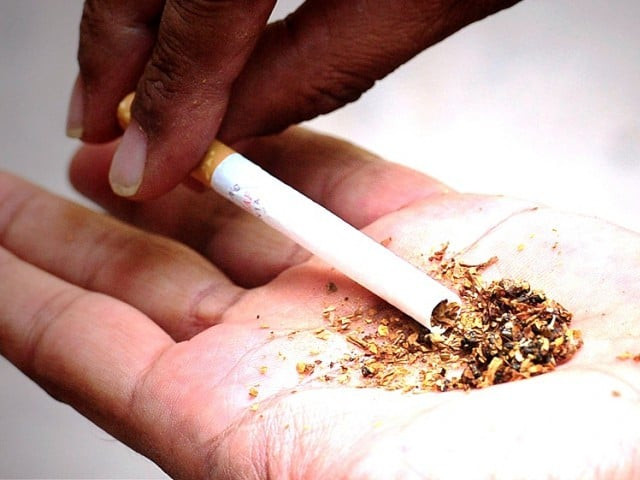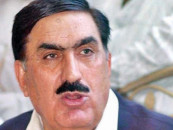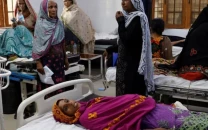Hooked pupils: Drug abuse plagues schoolchildren
Poor detection measures allow circulation of new varieties of substances

As the youth bears the brunt of the political discontent and economic collapse marking the public sphere, the pervasive circulation of drugs across educational institutions, acts as the final brick in its wall of destruction.
Despite the local government announcing several declarations aimed at eliminating the possession, sale, propagation and consumption of drugs from the port city, the problem has continuously aggravated, to a point where drug abuse has infiltrated the education system and the schools and colleges which were meant to discipline the future generations, are now acting as breeding grounds for the development of heinous lifelong addictions, which carry devastating consequences for the child addicts social and academic progress.
Zain, a multi-drug addicted student from Saddar, started consuming ice and crystal when his friends at school introduced him and his older brother to the addiction.
“We used to make concoctions of drugs in the restroom located on the fourth floor of our school. Since this floor was usually unsupervised, we never got caught,” shrugged Zain.
From that point onwards there was no going back for Zain, who soon started taking three other types of drugs, all of which brought with them a plethora of pernicious, mental and physical effects.
“At first my reaction time was impacted, since it would take me a long time to process a teacher’s question or remark at school and I would just be staring at her with a blank expression. But gradually my speech also started changing, and I could no longer utter a proper sentence without stuttering in between,” shared Zain.
It was at this point that Zain’s covert addiction became apparent and his parents withdrew him from school and decided to enroll him into a local rehabilitation center. However, soon after Zain’s treatment was completed, he fell back into his old addictions and would bet on snooker matches to earn quick money for buying drugs from the Jhande Shah area of Karachi, all under the nose of the police patrolling nearby.
Aware of the high probability of drug relapse due to police complicity and peer pressure, some thoughtful parents like those of a former drug addict, decided to switch neighborhoods and schools, in order to save their recovered child from the vice.
“Soon after I overcame my addiction, I left my old neighborhood and school since these places were infested with drugs,” revealed the former addict, who previously studied at a private school located near Shahrah-e-Faisal.
According to Julian Justine, a senior counselor at a rehabilitation center based in Saddar, the problem of drug addiction in schoolchildren is growing immensely, so much so that while previously most rehabilitation centers were only receiving high school students, many are now even treating students as young as fifth graders.
“Numerous small vendors and pan shops surrounding schools in areas like Saddar, are selling tissue drugs and e-cigarettes to children using code names like Garda and Valo, without any clue to the parents, the school administration or the police,” regretted Justine.
While Rafia Mallah, Additional Director of Private Institutions Sindh, conceded to the wide circulation of e-cigarettes and tissue drugs in schools, she also maintained that most schools including well-known institutions like Beaconhouse, Bayview, Karachi Grammar and Mama Parsi, all have permanent doctors on-board for inspecting and counselling children taking drugs.
“Some drugs cannot be identified with a physical examination since they are odorless,” differed Dr. Fateh Iqbal, a psychologist, “their addictions too cannot be treated through psychological counselling alone,” added Dr. Iqbal.
According to sources privy to the Express Tribune, drugs ranging from Sheesha, Ice, Crystal and Marijuana are all being openly exchanged among schoolchildren in educational institutions located in posh localities like Clifton and Defense, as well in other government schools across the city since 2019.
“Unfortunately, the government is not devising ways to curb the supply of drugs. Until or unless the root cause of the problem is eliminated, drugs will continue to circulate in our schools,” informed a source on the condition of anonymity.
Where some government school and college students have cheap copies of drugs available, those studying in lavish private schools have a wide variety of smuggled, expensive substances to choose from, which renders the cause of curbing the vice even more pertinent.
In their attempts to figure a way out of the drug dilemma haunting school administrations and parents, the top representatives of renowned private schools including Beaconhouse, City School, Karachi Grammar School, Haq Academy, Bay View and Nixor College, alongside officials from surveillance agencies, met on May 9 for a meeting arranged by the School Education and Literacy Department, to discuss plausible solution.
Among the recommendations discussed during the meeting, several concerned the usage of Quranic teachings, public service messages and Friday sermons alongside assistance of the Anti-Narcotics Force for combatting drug addiction. Some officials also proposed carrying out blood tests on school campuses to detect substance using pupils.
Speaking to the Express Tribune on the matter, Ghulam Akbar Leghari acknowledged the dire need for a proper mechanism to identify and treat drug abuse in schoolchildren. “The Sindh government has decided to conduct blood screening of students on campuses in order to curb drug circulation and rehabilitate the addicted students,” said Leghari.
include them in the workers category so that they may receive the employment benefits and social security that they deserve,” asserted Iqbal while talking to The Express Tribune.
Published in The Express Tribune, June 5th, 2023.



















COMMENTS
Comments are moderated and generally will be posted if they are on-topic and not abusive.
For more information, please see our Comments FAQ